英文高分作文 当苏格拉底遇到孔子
- 格式:wps
- 大小:18.00 KB
- 文档页数:3
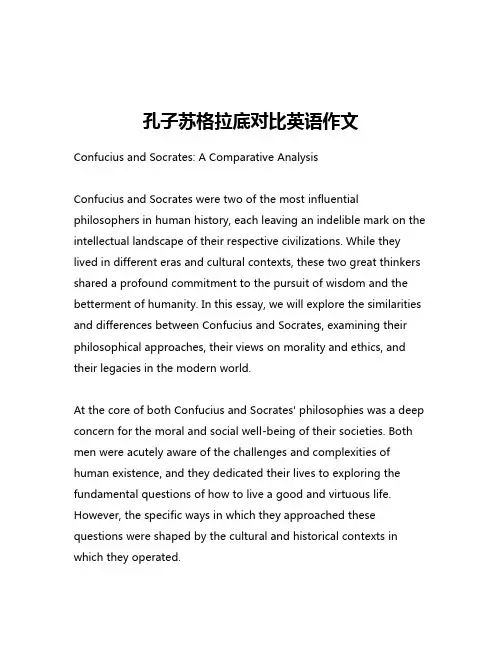
孔子苏格拉底对比英语作文Confucius and Socrates: A Comparative AnalysisConfucius and Socrates were two of the most influential philosophers in human history, each leaving an indelible mark on the intellectual landscape of their respective civilizations. While they lived in different eras and cultural contexts, these two great thinkers shared a profound commitment to the pursuit of wisdom and the betterment of humanity. In this essay, we will explore the similarities and differences between Confucius and Socrates, examining their philosophical approaches, their views on morality and ethics, and their legacies in the modern world.At the core of both Confucius and Socrates' philosophies was a deep concern for the moral and social well-being of their societies. Both men were acutely aware of the challenges and complexities of human existence, and they dedicated their lives to exploring the fundamental questions of how to live a good and virtuous life. However, the specific ways in which they approached these questions were shaped by the cultural and historical contexts in which they operated.Confucius, born in the state of Lu in what is now modern-day China, lived during a tumultuous period in Chinese history marked by political instability and social upheaval. In response to these challenges, Confucius developed a philosophical system that emphasized the importance of social harmony, filial piety, and the cultivation of virtuous character. Central to his teachings was the concept of ren, or benevolence, which he saw as the foundation of all human relationships and the key to a well-ordered society.Socrates, on the other hand, lived in ancient Athens during a time of political and intellectual ferment. Unlike Confucius, who focused on the practical application of his teachings, Socrates was primarily concerned with the pursuit of abstract philosophical truth. He was renowned for his use of the Socratic method, a dialogical approach to questioning and challenging the assumptions of his interlocutors, with the ultimate goal of uncovering the fundamental nature of knowledge and virtue.Despite these differences in approach, both Confucius and Socrates shared a deep commitment to the idea that the cultivation of moral and ethical character was essential for the well-being of both the individual and the community. Confucius believed that by adhering to the principles of ren and li (propriety), individuals could cultivate the virtues necessary to maintain social harmony and fulfill their roles within the family and the state. Socrates, on the other hand, arguedthat the pursuit of truth and wisdom was the highest calling of the philosopher, and that by understanding the nature of virtue, individuals could live more fulfilling and ethical lives.Another key area of similarity between Confucius and Socrates was their emphasis on the importance of education and the role of the teacher in shaping the moral and intellectual development of their students. Both men believed that the transmission of knowledge and the cultivation of wisdom were essential for the betterment of society, and they devoted themselves to the task of educating the next generation of leaders and thinkers.However, the specific approaches that Confucius and Socrates took to education differed significantly. Confucius believed in a more structured and hierarchical model of education, in which the teacher played a central role in imparting knowledge and shaping the character of the student. He emphasized the importance of mastering the classical texts and the rituals of proper conduct, and he saw the teacher as a moral exemplar who could guide students towards the cultivation of virtuous character.Socrates, on the other hand, took a more egalitarian and dialogical approach to education. Rather than simply imparting knowledge, he saw his role as a facilitator of inquiry, challenging his students to think critically and to question their own assumptions. He believedthat true wisdom could only be attained through the active engagement of the mind, and he used his famous method of questioning to guide his students towards a deeper understanding of the nature of knowledge and virtue.Despite these differences, both Confucius and Socrates shared a deep commitment to the belief that the cultivation of moral and ethical character was essential for the well-being of both the individual and the community. They recognized the inherent dignity and worth of the human person, and they dedicated their lives to the pursuit of wisdom and the betterment of humanity.In the modern world, the legacies of Confucius and Socrates continue to be felt in a variety of ways. Confucianism, with its emphasis on social harmony, filial piety, and the cultivation of virtuous character, has had a profound impact on the cultural and political development of East Asian societies. Meanwhile, Socratic philosophy, with its emphasis on critical thinking, the pursuit of truth, and the importance of moral and ethical development, has had a lasting influence on Western intellectual traditions.Moreover, the teachings of both Confucius and Socrates continue to be relevant and applicable to the challenges of the modern world. As we grapple with issues of social and political instability, the erosion of traditional values, and the need for ethical and moral leadership,the insights and wisdom of these two great thinkers can offer valuable guidance and inspiration.In conclusion, while Confucius and Socrates lived in vastly different cultural and historical contexts, they shared a deep commitment to the pursuit of wisdom and the betterment of humanity. Through their respective philosophical approaches, they have left an indelible mark on the intellectual and cultural landscapes of their respective civilizations, and their legacies continue to shape the way we think about the fundamental questions of human existence. By exploring the similarities and differences between these two great thinkers, we can gain a richer and more nuanced understanding of the human experience, and be inspired to continue the ongoing pursuit of wisdom and ethical development.。
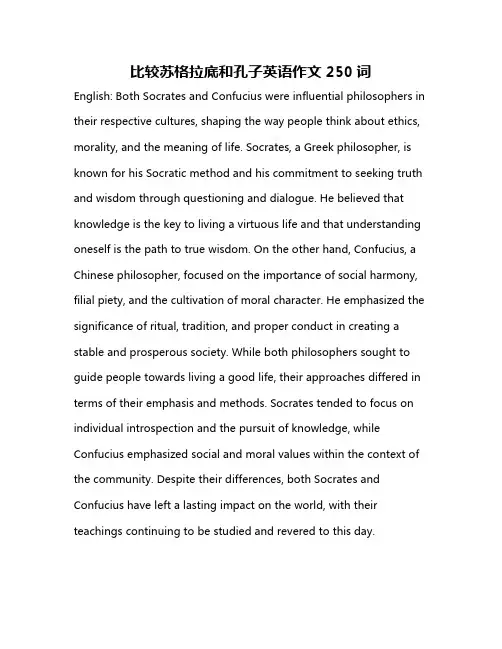
比较苏格拉底和孔子英语作文250词English: Both Socrates and Confucius were influential philosophers in their respective cultures, shaping the way people think about ethics, morality, and the meaning of life. Socrates, a Greek philosopher, is known for his Socratic method and his commitment to seeking truth and wisdom through questioning and dialogue. He believed that knowledge is the key to living a virtuous life and that understanding oneself is the path to true wisdom. On the other hand, Confucius, a Chinese philosopher, focused on the importance of social harmony, filial piety, and the cultivation of moral character. He emphasized the significance of ritual, tradition, and proper conduct in creating a stable and prosperous society. While both philosophers sought to guide people towards living a good life, their approaches differed in terms of their emphasis and methods. Socrates tended to focus on individual introspection and the pursuit of knowledge, while Confucius emphasized social and moral values within the context of the community. Despite their differences, both Socrates and Confucius have left a lasting impact on the world, with their teachings continuing to be studied and revered to this day.中文翻译: 苏格拉底和孔子都是各自文化中有影响力的哲学家,塑造了人们对伦理道德和生活意义的思考方式。
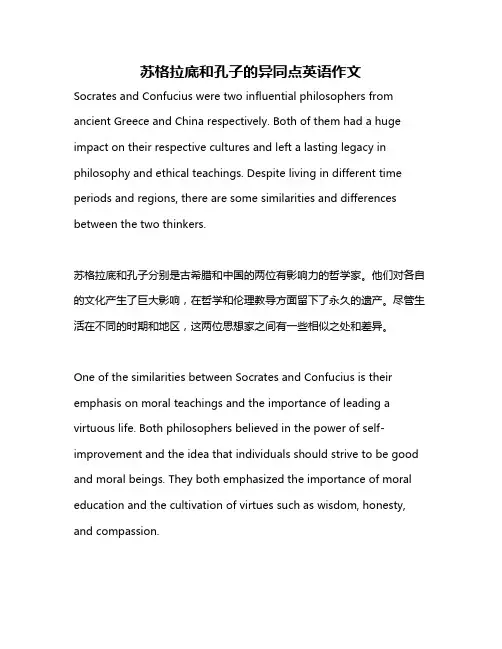
苏格拉底和孔子的异同点英语作文Socrates and Confucius were two influential philosophers from ancient Greece and China respectively. Both of them had a huge impact on their respective cultures and left a lasting legacy in philosophy and ethical teachings. Despite living in different time periods and regions, there are some similarities and differences between the two thinkers.苏格拉底和孔子分别是古希腊和中国的两位有影响力的哲学家。
他们对各自的文化产生了巨大影响,在哲学和伦理教导方面留下了永久的遗产。
尽管生活在不同的时期和地区,这两位思想家之间有一些相似之处和差异。
One of the similarities between Socrates and Confucius is their emphasis on moral teachings and the importance of leading a virtuous life. Both philosophers believed in the power of self-improvement and the idea that individuals should strive to be good and moral beings. They both emphasized the importance of moral education and the cultivation of virtues such as wisdom, honesty, and compassion.苏格拉底和孔子之间的一个相似之处是他们强调道德教导和领导一个有道德的生活的重要性。
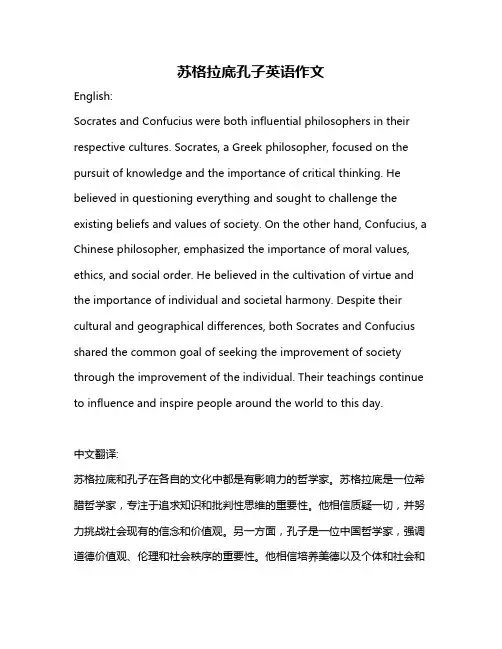
苏格拉底孔子英语作文English:Socrates and Confucius were both influential philosophers in their respective cultures. Socrates, a Greek philosopher, focused on the pursuit of knowledge and the importance of critical thinking. He believed in questioning everything and sought to challenge the existing beliefs and values of society. On the other hand, Confucius, a Chinese philosopher, emphasized the importance of moral values, ethics, and social order. He believed in the cultivation of virtue and the importance of individual and societal harmony. Despite their cultural and geographical differences, both Socrates and Confucius shared the common goal of seeking the improvement of society through the improvement of the individual. Their teachings continue to influence and inspire people around the world to this day.中文翻译:苏格拉底和孔子在各自的文化中都是有影响力的哲学家。
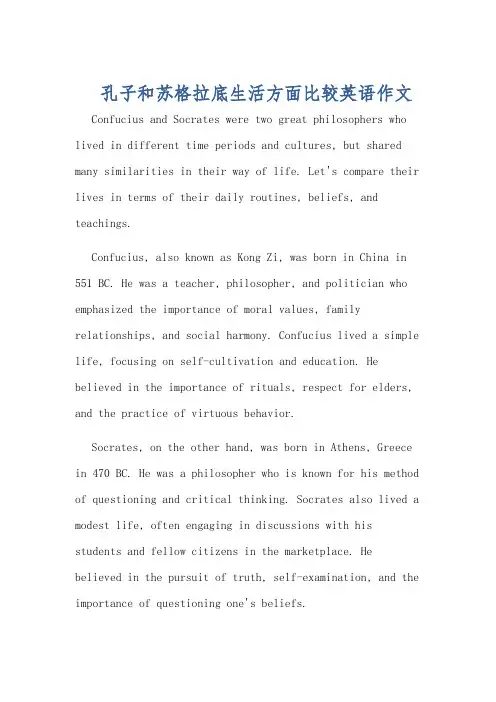
孔子和苏格拉底生活方面比较英语作文Confucius and Socrates were two great philosophers who lived in different time periods and cultures, but shared many similarities in their way of life. Let's compare their lives in terms of their daily routines, beliefs, and teachings.Confucius, also known as Kong Zi, was born in China in 551 BC. He was a teacher, philosopher, and politician who emphasized the importance of moral values, family relationships, and social harmony. Confucius lived a simple life, focusing on self-cultivation and education. He believed in the importance of rituals, respect for elders, and the practice of virtuous behavior.Socrates, on the other hand, was born in Athens, Greece in 470 BC. He was a philosopher who is known for his method of questioning and critical thinking. Socrates also lived a modest life, often engaging in discussions with his students and fellow citizens in the marketplace. He believed in the pursuit of truth, self-examination, and the importance of questioning one's beliefs.Both Confucius and Socrates were known for their ethical teachings and their emphasis on moral values. They both believed in the importance of self-improvement and the cultivation of virtues such as wisdom, kindness, and justice. They also shared a common goal of educating the younger generation and promoting social harmony.In terms of their daily routines, Confucius and Socrates both spent a significant amount of time teaching and engaging in philosophical discussions. Confucius taught his students the importance of filial piety, loyalty, and righteousness, while Socrates encouraged his followers to question their beliefs and think critically about the world around them.Despite their differences in culture and beliefs, Confucius and Socrates were both dedicated to the pursuit of knowledge, wisdom, and virtue. They continue to inspire people around the world with their teachings on ethics, morality, and the importance of living a meaningful life.孔子和苏格拉底是两位伟大的哲学家,虽然生活在不同的时期和文化中,但在他们的生活方式上有许多相似之处。
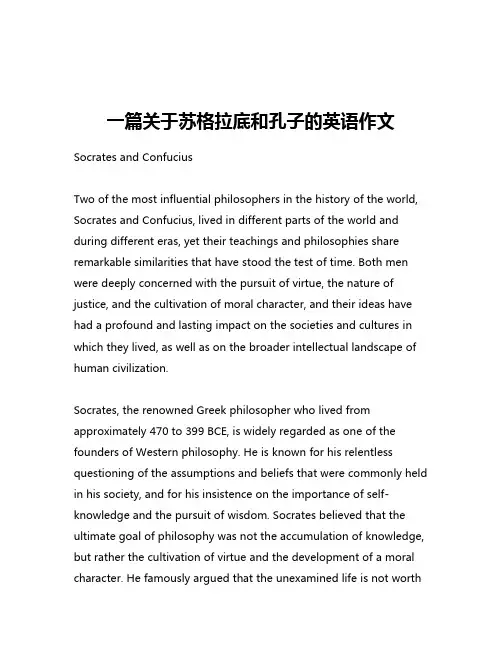
一篇关于苏格拉底和孔子的英语作文Socrates and ConfuciusTwo of the most influential philosophers in the history of the world, Socrates and Confucius, lived in different parts of the world and during different eras, yet their teachings and philosophies share remarkable similarities that have stood the test of time. Both men were deeply concerned with the pursuit of virtue, the nature of justice, and the cultivation of moral character, and their ideas have had a profound and lasting impact on the societies and cultures in which they lived, as well as on the broader intellectual landscape of human civilization.Socrates, the renowned Greek philosopher who lived from approximately 470 to 399 BCE, is widely regarded as one of the founders of Western philosophy. He is known for his relentless questioning of the assumptions and beliefs that were commonly held in his society, and for his insistence on the importance of self-knowledge and the pursuit of wisdom. Socrates believed that the ultimate goal of philosophy was not the accumulation of knowledge, but rather the cultivation of virtue and the development of a moral character. He famously argued that the unexamined life is not worthliving, and he spent much of his time engaged in dialogues and debates with his fellow citizens, challenging them to think critically about their values and beliefs.One of the key tenets of Socratic philosophy was the idea of the "Socratic method," a form of inquiry in which the philosopher would pose a series of questions to his interlocutor in order to gradually uncover the flaws and inconsistencies in their reasoning. Through this process, Socrates aimed to help his followers achieve a deeper understanding of the nature of truth and justice, and to inspire them to continually question and refine their own beliefs and assumptions.Confucius, on the other hand, was a Chinese philosopher who lived from approximately 551 to 479 BCE, several decades after the time of Socrates. Like Socrates, Confucius was deeply concerned with the cultivation of moral character and the promotion of social harmony. He believed that the key to a well-ordered and prosperous society lay in the cultivation of virtues such as benevolence, righteousness, propriety, and filial piety.Confucius' teachings were centered around the idea of the "Mandate of Heaven," the belief that the legitimacy of a ruler or government was derived from its ability to uphold the moral and ethical principles that were seen as divinely ordained. He argued that the primary responsibility of a ruler was to set an example of moral andethical behavior for his subjects, and to create a social and political system that would encourage the cultivation of these virtues.One of the central tenets of Confucian philosophy was the idea of the "Five Relationships," which outlined the hierarchical and reciprocal obligations that should govern the interactions between different members of society. These relationships included those between ruler and subject, father and son, husband and wife, elder and younger, and friend and friend. Confucius believed that by fulfilling these obligations and maintaining these relationships, individuals and societies could achieve a high degree of social harmony and moral order.While Socrates and Confucius lived in very different cultural and historical contexts, there are a number of striking similarities between their philosophies and teachings. Both men were deeply concerned with the cultivation of moral character and the promotion of social harmony, and both believed that the pursuit of wisdom and virtue should be the primary goal of the individual and the state.Both Socrates and Confucius also placed a strong emphasis on the importance of education and the role of the teacher in the intellectual and moral development of their students. Socrates was known for his Socratic dialogues, in which he would engage in a process of questioning and inquiry with his followers in order to helpthem develop a deeper understanding of the world around them. Similarly, Confucius was renowned for his role as a teacher and mentor, and his teachings were transmitted and preserved through the generations by his devoted followers.Furthermore, both Socrates and Confucius were deeply critical of the political and social systems of their time, and they used their philosophical teachings as a means of challenging the prevailing norms and values of their respective societies. Socrates was ultimately condemned to death for his perceived subversion of the Athenian state, while Confucius spent much of his life seeking to influence the rulers of his time and promote a more just and ethical system of government.Despite these similarities, there are also some important differences between the philosophies of Socrates and Confucius. Socrates was primarily concerned with the pursuit of universal truths and the development of a rational and logical approach to understanding the world, while Confucius was more focused on the practical application of ethical principles in the context of social and political relationships.Moreover, while Socrates was deeply skeptical of the idea of divineor metaphysical forces, Confucius' teachings were heavily influenced by the concept of the "Mandate of Heaven" and the belief in a higher moral order that governed the universe.Ultimately, however, the teachings and philosophies of Socrates and Confucius share a common thread in their emphasis on the importance of moral character, the cultivation of virtue, and the pursuit of wisdom. Both men have had a profound and enduring impact on the intellectual and cultural landscapes of their respective societies, and their ideas continue to be studied and debated by scholars and thinkers around the world.。
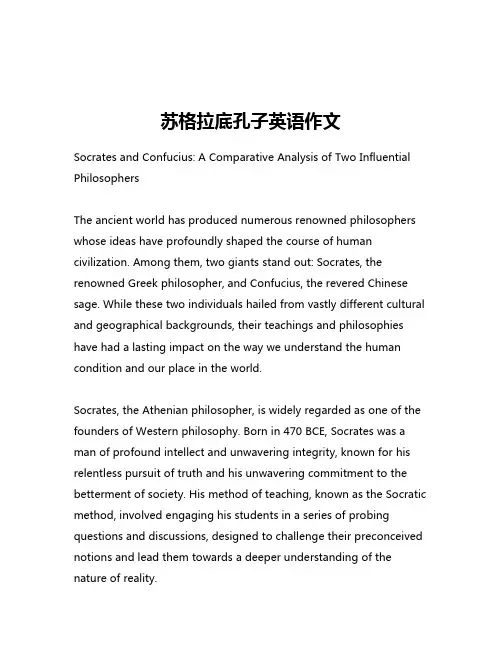
苏格拉底孔子英语作文Socrates and Confucius: A Comparative Analysis of Two Influential PhilosophersThe ancient world has produced numerous renowned philosophers whose ideas have profoundly shaped the course of human civilization. Among them, two giants stand out: Socrates, the renowned Greek philosopher, and Confucius, the revered Chinese sage. While these two individuals hailed from vastly different cultural and geographical backgrounds, their teachings and philosophies have had a lasting impact on the way we understand the human condition and our place in the world.Socrates, the Athenian philosopher, is widely regarded as one of the founders of Western philosophy. Born in 470 BCE, Socrates was a man of profound intellect and unwavering integrity, known for his relentless pursuit of truth and his unwavering commitment to the betterment of society. His method of teaching, known as the Socratic method, involved engaging his students in a series of probing questions and discussions, designed to challenge their preconceived notions and lead them towards a deeper understanding of the nature of reality.At the heart of Socrates' philosophy was the belief that true wisdom lies in the recognition of one's own ignorance. He famously proclaimed, "I am wiser than this man, for neither of us appears to know anything great and good; but he fancies he knows a great deal, and is so confident in his knowledge, whereas I, as I do not know, so I so I am not so confident." This humble acknowledgment of the limits of human knowledge was a hallmark of Socratic thought, and it stood in stark contrast to the dogmatism and certainty that often characterized the thinking of his contemporaries.Socrates' unwavering commitment to the pursuit of truth and the betterment of society led him into conflict with the Athenian establishment, which ultimately resulted in his trial and execution on charges of impiety and corrupting the youth. Despite this tragic end, Socrates' legacy lived on through his students, most notably the great philosopher Plato, who went on to establish the renowned Academy and further develop the Socratic method.Confucius, on the other hand, was a revered Chinese philosopher who lived during the turbulent period of the Spring and Autumn era in ancient China. Born in 551 BCE, Confucius dedicated his life to the study and propagation of his philosophical teachings, which centered around the importance of social harmony, ethical conduct, and the cultivation of virtuous character.At the heart of Confucian thought was the belief that human beings can achieve moral and social perfection through the diligent cultivation of their character and the fulfillment of their roles and responsibilities within society. Confucius emphasized the importance of filial piety, respect for elders, and the cultivation of virtues such as benevolence, righteousness, propriety, and wisdom. He believed that by embodying these virtues, individuals could contribute to the creation of a harmonious and prosperous society.Unlike Socrates, who engaged in a relentless questioning of established beliefs and norms, Confucius sought to preserve and revitalize the traditions and cultural practices of ancient China. He believed that the key to social and political stability lay in the restoration of the moral and ethical foundations of society, which had been eroded by the turmoil and chaos of his time.Despite their differences in approach, both Socrates and Confucius shared a profound commitment to the betterment of humanity and the pursuit of truth and wisdom. Both philosophers recognized the inherent complexities and challenges of the human condition, and they sought to develop philosophical frameworks that could guide individuals and societies towards a more fulfilling and harmonious existence.The legacies of Socrates and Confucius continue to resonate across the globe, inspiring countless individuals to grapple with the fundamental questions of human existence and to strive towards the creation of a more just and equitable world. Their teachings have influenced the development of countless philosophical, religious, and political movements, and their ideas continue to shape the way we understand the human experience.In conclusion, the comparative analysis of Socrates and Confucius reveals the profound impact that two remarkable individuals can have on the course of human history. Their ideas, teachings, and philosophies have endured the test of time, serving as beacons of wisdom and inspiration for generations to come. As we continue to navigate the complexities of the modern world, the insights and wisdom of these two great philosophers remain as relevant and essential as ever.。
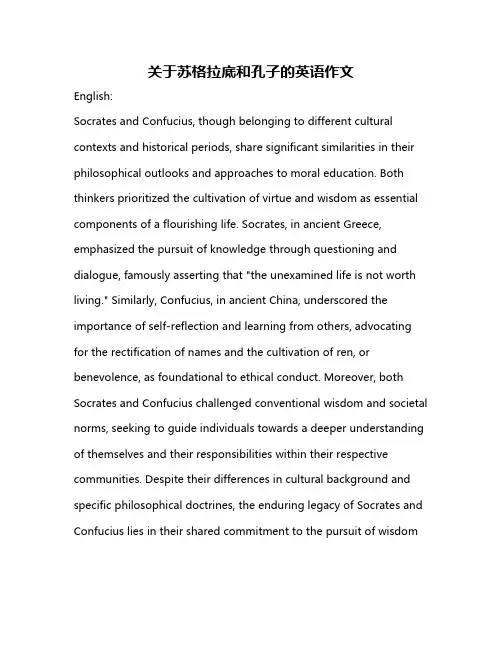
关于苏格拉底和孔子的英语作文English:Socrates and Confucius, though belonging to different cultural contexts and historical periods, share significant similarities in their philosophical outlooks and approaches to moral education. Both thinkers prioritized the cultivation of virtue and wisdom as essential components of a flourishing life. Socrates, in ancient Greece, emphasized the pursuit of knowledge through questioning and dialogue, famously asserting that "the unexamined life is not worth living." Similarly, Confucius, in ancient China, underscored the importance of self-reflection and learning from others, advocating for the rectification of names and the cultivation of ren, or benevolence, as foundational to ethical conduct. Moreover, both Socrates and Confucius challenged conventional wisdom and societal norms, seeking to guide individuals towards a deeper understanding of themselves and their responsibilities within their respective communities. Despite their differences in cultural background and specific philosophical doctrines, the enduring legacy of Socrates and Confucius lies in their shared commitment to the pursuit of wisdomand moral excellence as pathways to a more just and harmonious society.中文翻译:苏格拉底和孔子虽然属于不同的文化背景和历史时期,但在哲学观念和道德教育方面有着显著的相似之处。
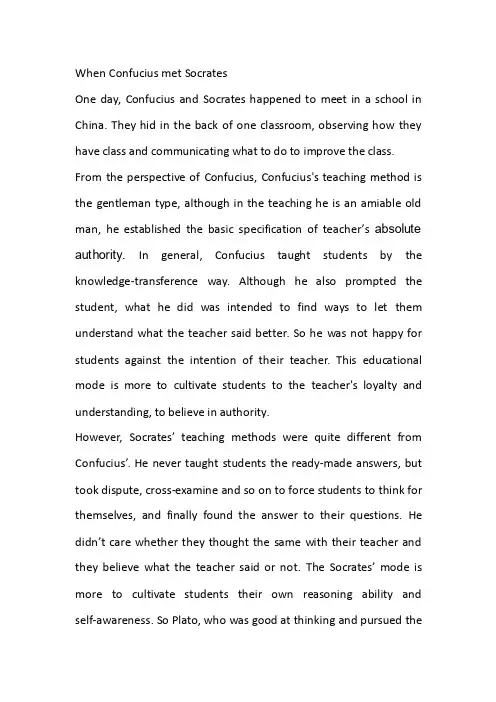
When Confucius met SocratesOne day, Confucius and Socrates happened to meet in a school in China. They hid in the back of one classroom, observing how they have class and communicating what to do to improve the class. From the perspective of Confucius, Confucius's teaching method is the gentleman type, although in the teaching he is an amiable old man, he established the basic specification of teacher’s absolute authority. In general, Confucius taught students by the knowledge-transference way. Although he also prompted the student, what he did was intended to find ways to let them understand what the teacher said better. So he was not happy for students against the intention of their teacher. This educational mode is more to cultivate students to the teacher's loyalty and understanding, to believe in authority.However, Socrates’teaching methods were quite different from Confucius’. He never taught students the ready-made answers, but took dispute, cross-examine and so on to force students to think for themselves, and finally found the answer to their questions. He didn’t care whether they thought the same with their teacher and they believe what the teacher said or not. The Socrates’mode is more to cultivate students their own reasoning ability and self-awareness. So Plato, who was good at thinking and pursued thedialectical way, became the heir of Socrates' education style.From the way of education, Confucius transmitted knowledge while Socrates forced students themselves to get knowledge; Confucius taught people to believe while Socrates taught them to doubt.Of course, they both paid attention to the heuristic teaching and encouraged independent thinking instead of the force-feeding teaching with results given directly. If they two learnt the teaching idea from each other, the world culture will be further integration. Also, China's feudal culture bound won't continue for so long. Last but not least, the cultural conflicts will be reduced and the world will be more peaceful.。
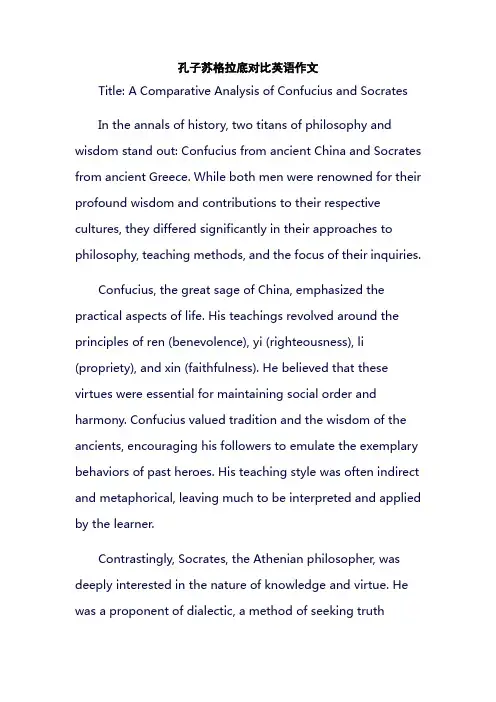
孔子苏格拉底对比英语作文 Title: A Comparative Analysis of Confucius and Socrates
In the annals of history, two titans of philosophy and wisdom stand out: Confucius from ancient China and Socrates from ancient Greece. While both men were renowned for their profound wisdom and contributions to their respective cultures, they differed significantly in their approaches to philosophy, teaching methods, and the focus of their inquiries.
Confucius, the great sage of China, emphasized the practical aspects of life. His teachings revolved around the principles of ren (benevolence), yi (righteousness), li (propriety), and xin (faithfulness). He believed that these virtues were essential for maintaining social order and harmony. Confucius valued tradition and the wisdom of the ancients, encouraging his followers to emulate the exemplary behaviors of past heroes. His teaching style was often indirect and metaphorical, leaving much to be interpreted and applied by the learner.
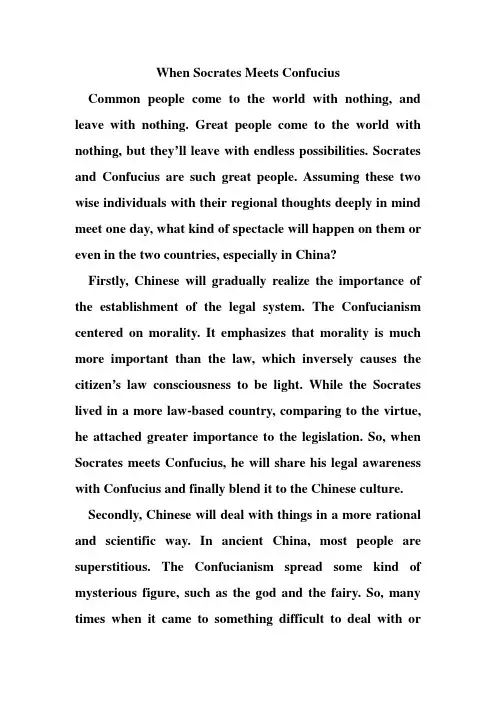
When Socrates Meets ConfuciusCommon people come to the world with nothing, and leave with nothing. Great people come to the world with nothing, but they’ll leave with endless possibilities. Socrates and Confucius are such great people. Assuming these two wise individuals with their regional thoughts deeply in mind meet one day, what kind of spectacle will happen on them or even in the two countries, especially in China?Firstly, Chinese will gradually realize the importance of the establishment of the legal system. The Confucianism centered on morality. It emphasizes that morality is much more important than the law, which inversely causes the citizen’s law consciousness to be light. While the Socrates lived in a more law-based country, comparing to the virtue, he attached greater importance to the legislation. So, when Socrates meets Confucius, he will share his legal awareness with Confucius and finally blend it to the Chinese culture. Secondly, Chinese will deal with things in a more rational and scientific way. In ancient China, most people are superstitious. The Confucianism spread some kind of mysterious figure, such as the god and the fairy. So, many times when it came to something difficult to deal with orexplain to the civilians, the rulers may choose to advocate the illusory theology to comfort them. This kind of handling will only cover up the facts in short term. While Socrates’thought is scientific, he may have an absolutely different way to deal with the same thing. Thus, when Socrates meets Confucius, as the days progressed, Chinese will be more rational and no longer depend on the so called god to bless for a good life, but try to work hard on their own.Thirdly, Chinese culture will be more inclusive and exoteric in academic. The Confucianism is almost authoritarian in the ancient times, especially in the Qing dynasty, which limited the development of other schools. Whereas the Socrates treats the academic in a broader way, he recognizes the freedom of learning. Therefore, when Socrates meets Confucius, Chinese culture will develop in a more inclusive and exoteric way. Different thoughts will integrate and the Chinese culture will“sparking”.In conclusion, if Socrates meets Confucius, great changes must have happened to China in the establishment of the legal system, the rational and scientific Chinese manners of dealing with things and the more inclusive and exoteric Chinese culture.。
苏格拉底与孔子的比较英语作文Title: Socrates and Confucius: A Comparative AnalysisIn the vast landscape of human thought and wisdom, two towering figures stand out as beacons of light: Socrates of Greece and Confucius of China. Their contributions to philosophy, ethics, and governance, though separated by vast cultural, geographical, and historical distances, continue to resonate with people around the world. This essay aims to explore the similarities and differences between the philosophical influences of Socrates and Confucius. Socrates, a Greek philosopher who lived in Athens in the 5th century BCE, was a proponent of the importance of reason and virtue. His method of questioning, known as the Socratic method, revolutionized the way people approached truth and wisdom. Socrates believed that true knowledge came from self-examination and critical thinking, often posing probing questions to his students and peers in order to challenge assumptions and seek deeper understanding. His ethical philosophy revolved around the concept of virtue, emphasizing the importance of living a virtuous life and cultivating moral excellence. Socrates' emphasis on reason, virtue, and self-examination shaped the foundations of Western philosophy and ethics.On the other side of the world, Confucius, a Chinese philosopher and educator who lived in the 6th century BCE, advocated for social harmony, respect for authority, and the Golden Rule. His teachings, known as Confucianism, have had a profound impact on Chinese culture and beyond. Confucius emphasized the importance of human relationships, emphasizing the need for harmony and balance in society. He believed that through education, individuals could cultivate virtues such as benevolence, righteousness, propriety, and wisdom, leading to a more just and harmonious society. Confucius' focus on human relationships, social harmony, and education has had a lasting influence on Asian cultures and beyond.Despite their differences in approach and emphasis, Socrates and Confucius share a common belief in the power of reason and virtue to transform individuals and society. Both philosophers recognized the importance of self-examination and critical thinking in the pursuit of truth and wisdom. However, their perspectives on the nature of reality and the role of reason differed. Socrates' emphasis on logic and rationality led him to explore the abstract nature of truth and reality, while Confucius focused more on practical applications of wisdom and virtue in daily life.In conclusion, Socrates and Confucius represent two distinct yet complementary perspectives on human thought and wisdom.Socrates' emphasis on reason, virtue, and self-examination shaped the foundations of Western philosophy and ethics, while Confucius' focus on social harmony, education, and human relationships has had a profound impact on Asian cultures and beyond. Their contributions to philosophy, ethics, and governance continue to inspire people around the world to seek truth, wisdom, and virtue in their lives.。
苏格拉底和孔子的异同点英语作文Socrates and Confucius: Two Really Smart Old GuysA long, long time ago, there were two super wise men named Socrates and Confucius. They lived in different places, but both of them helped shape how we think about things like ethics, justice, and how to be a good person. Let me tell you about them!SocratesSocrates was a Greek philosopher who lived in Athens around 470-399 BC. He didn't write any books, but his brilliant student Plato wrote down a lot of Socrates' ideas.Socrates loved to ask questions - he was like a little kid always saying "Why? Why? Why?" But his questions made people think deeply about important concepts like virtue, justice, and the purpose of human life. His favorite way to teach was some thing called the "Socratic method" where he would question people's beliefs to show there were flaws in their logic.One of Socrates' most famous ideas is that he was wiser than everyone else because he knew that he knew nothing! Weird, right? What he meant is that truly wise people understand how little they actually know compared to the vast world ofknowledge out there. Pretty deep stuff for an old dude who lived so long ago!Another key principle was his motto "Know thyself." Socrates pushed people to look inward and examine their core values, ignorances, and inconsistencies in their beliefs. He wanted people to live an "examined life" where they questioned everything instead of just blindly accepting traditions or leaders.Socrates got in big trouble for corrupting the minds of Athenian youth with his radical ideas. He was put on trial and sentenced to death by drinking a poison hemlock shake (yuck!). But even when facing execution, he showed amazing integrity by choosing to obey the unjust law rather than escape. What a brave guy!ConfuciusNow let's talk about Confucius, the renowned Chinese teacher and philosopher. He lived over 2,400 years ago from around 551-479 BC during the chaotic Warring States period.Confucius traveled around ancient China sharing his wisdom on ethics, morality, and good governance. He wanted to restore peace and order by reviving the traditions and rituals of the earlier Zhou dynasty. His philosophy was all about relationships,social harmony, and behaving with "ren" - that means humaneness, compassion and virtue.One of Confucius' core teachings was about "The Superior Man." This wasn't about being better than others, but about cultivating virtues like integrity, righteousness, loyalty and studying to constantly improve oneself. Confucius taught that everyone could become a Superior Man or Woman through discipline and education, not just the nobility.He also stressed the importance of filial piety - honoring and obeying your parents and elders. Family was the foundation of an orderly society in Confucian philosophy. Children should obey their fathers, everyone should respect their rulers, and people should perform duties based on their roles and status. If everyone did their part, Confucius believed it would create social stability.Confucius was really big on education too. He opened one of the first private schools in China and accepted students from all backgrounds based only on their ability and desire to learn - rich or poor, noble or common. He taught them important subjects like poetry, history, music, rituals and ethics to becomewell-rounded gentleman scholars. Smart guy!Similarities Between Socrates and ConfuciusSo those were the basic deets about Socrates and Confucius. Now let's look at some of the key similarities between these two brainiacs from way back when:They were both super influential teachers, not writers. Their philosophies spread through their devoted students writing down their spoken words and teaching methods.Ethics and virtue were the core focus - how to live a moral, meaningful life as a good human being. They pushed people to examine their beliefs and actions.They used a question-based approach to guide students' thinking, not just lecturing. Socrates literally questioned everything, while Confucius emphasized self-reflection.Both men lived with integrity, modeling the virtues they taught. They faced opposition and danger but stayed true to their principles.Education for everyone was important to them, not just the elite. They opened learning to all social classes based on merit.Differences Between Socrates and ConfuciusOf course, these two wise guys from ancient times also had some major differences:Socrates was more focused on individualism - pursuing personal virtue through reason and self-examination. Confucius emphasized collectivism - moral cultivatio n to create harmonious relationships and social order.Socrates challenged traditions and assumptions. Confucius sought to revive ancient rituals, customs and class structures of earlier dynasties.The Greek loved to debate and argue to reveal truth through questions. The Chinese teacher valued settled traditions and demanded obedience from students.Socrates was sentenced to death for his radical ideas by the state. Confucius' teachings were accepted and formed the basis for civil service education.Socrates had no interest in the supernatural or mythology. Confucian philosophy is intertwined with religious rituals honoring ancestors.Two Wise Old CootsWell, that's the lowdown on Socrates the question master of ancient Greece and Confucius the gentleman scholar of ancient China. Even though they lived worlds apart thousands of years ago, their thoughts and teachings still influence us today.These two wise old coots showed that virtue, ethics and constantly questioning yourself is the path to living a truly good life. They helped shape entire civilizations by mentoring passionate students and giving people a moral framework to live by.So whenever you're facing tough choices or complex questions in life, think about channeling your inner Socrates and Confucius - examine your values, stay humble about what you don't know, and always strive to do what is moral and just. Words to live by from two really smart old guys!。
关于苏格拉底和孔子的英语作文Title: Socrates and Confucius: Two Masters of WisdomThroughout the vast history of human civilization, there have been numerous philosophers and thinkers whose ideas and teachings have had profound impacts on society. Among these luminaries, Socrates and Confucius stand out as two remarkable masters of wisdom. Though separated by vast distances and diverse cultural backgrounds, their teachings share many commonalities while also exhibiting unique differences.Socrates, a Greek philosopher, lived in the 5th century BCE. He was renowned for his unique method of teaching, known as the "Socratic method," which involved engaging his students in dialogues and discussions to guide them towards discovering the truth through critical thinking. Socrates believed that true wisdom came from self-knowledge and self-examination, and he often challenged conventional beliefs and assumptions. His dedication to truth, justice, and virtue made him a source of inspiration for generations of thinkers.Confucius, on the other hand, was a Chinese philosopher who lived in the 6th century BCE. He was the founder of Confucianism, a philosophy that emphasizes morality, ethics, and social harmony. Confucius taught that individuals should strive to cultivate their moral character through self-cultivation and the practice of virtues such as kindness, honesty, and loyalty. He believed that a harmonious society could be achieved through the cultivation of individual virtue and the observance of proper social roles and relationships.Despite their differences in cultural background and teaching methods, Socrates and Confucius share a common concern for the moral and intellectual development of human beings. Both of them emphasized the importance of self-knowledge, self-cultivation, and the pursuit of truth and virtue. They also believed that education was a crucial tool for personal and societal development. However, there are also some significant differences between the two thinkers. Socrates' teaching method involved engaging his students in critical thinking and questioning assumptions, while Confucius focused more on the cultivation of moral character through the practice of virtues and the observance of social norms. Additionally, Socrates' teachings were more individualistic, emphasizing the importance of self-knowledge and self-reliance, while Confucius' philosophy was more collectivist, emphasizing the importance of social harmony and the observance of proper social roles and relationships.In conclusion, Socrates and Confucius are two remarkable thinkers whose ideas and teachings have had profound impacts on human history. Though separatedby vast distances and diverse cultural backgrounds, their shared concern for moral and intellectual development, as well as their unique insights into human nature and society, make them invaluable sources of wisdom for all ages.。
When Socrates meets ConfuciusGood evening ladies and gentlemen, it’s my honor to give you a speech here. Today, my speech is when Socrates meets Confucius.No one will know what sparks will be collided out when Confucius meet Socrates, but we know, they should solve one problem first ----that is the language.As we known, both Confucius and Socrates are great educators and philosophers dying for the pursuit of truth, however, when the two sages meet, who will be the winner to persuade the other to learn Chinese or greek? In order to settle the matter, they have to debate.In the view of Confucius, as he praises highly for the monarchy and believe in the authority, he will hold fast to Chinese, thus he can show his respect for the country as well as the king.On the other hand, Socrates put emphasis on personal development, for the sake of knowledge, he will accept Confucius’ advice with pleasure.Then the second problem comes out. In which way will Confucius teaches Socrates Chinese? “By reciting the ancient Chinese poems” This idea comes up to Confucius mind. But Socrates doesn’t agree with him. “I know Chinese nothing at all, how could I understand them?”“I will read them to you , and whenever you have questions ,you could ask.”As an education master, Confucius is best known for his teaching method to teach student in knowledge –transfer way, which is to teach student step by step. Nevertheless, Socrates never give his students the ready made answers. Instead, he likes to ask questions and put them in a contradiction situation, which is known as Socrates irony.All right, the words above are all my imagination. When Socrates meets Confucius, the two sages will surely exchanges their ideas about life, people, ethnics or may be languages as I said above. Although they have different views of political stands and teaching methods, they share the same goal to advocate the benevolence and goodness of people and to help them get out of the puzzles just like the guiding stars shining in the different parts of sky.Thank you for listening.。
When Socrates Meets ConfuciusI believe that many people are not sure what will happen if Socrates and Confucius meet at the same time. Both Socrates and Confucius are outstanding in their philosophy of human beings. Perhaps there are many similarities and differences between them, but I am more interested in their perspective in education. Now let me use an example.If Socrates and Confucius were participating in the skills competition for teachers in Sichuan province.Confucius was asked by a student judge,“if a man is drowning , I save him .Then his families will prepare to send me a head of cattle, and should I accept it or not? " Confucius answered him, "You should accept. After saving him, what will his families think about this? and then what will they do? "The judge replied, "they will appreciate me and then would give me something to express their gratitude to me.” Confucius said:"You accept her gifts and what do other people will think about this? and then how will you deal with it? "The judge added, "everyone can see my rewards and it will raise the enthusiasm of rescuing others, and later on seeing a man drowning, they will rush to rescue him. “Confucius nodded.The student judge put the same question to ask the other teacher,Socrates. Socrates asked him, "What is your own opinion? and why do you think so? "The student replied, "it is wrong to receive people's gifts because saving others is a good deed .After all, receiving other people's stuff is not my intention"."What you say does make sense."Socrates said. The student went on to say," but I think I should regard it as our duty, and in this case will everyone know the importance of saving others and volunteer to do this. "Socrates clapped to praise him.From the conversation mentioned above, it is observed that Confucius' heuristic methods of teaching is so practical to enlighten students. He proposes that students should learn and think organically, acquire knowledge independently, and develop cognitive abilities. That is a prominent feature in his teaching process.However, when Socrates is teaching, he likes keeping students putting forward various questions by their own. When his students are unable to come up with the correct answers to the questions, he was not anxious to correct mistakes. Instead, he asks a question in reply to the mistakes so that they become more pronounced and students are trapped into a confusing situation. Then the students think there issomething that turns out to be wrong or flawed, which makes their original ideas disintegrate completely.Needless to say, it will be more significant if we could integrate Confucius 'and Socrates’methods with each other and finally establish a new and all-embracing one during global times. However, one of the indispensable prerequisites for this integration is that we ought to discern the similarities and differences between them carefully and then ascertain their spirits and distinctive advantages and disadvantages in practice. Therefore, when Socrates Meets Confucius, they are likely to collaborate to manage a school well. Do you think so?。
孔子和苏格拉底对比英语作文## A Comparative Study of Confucius and Socrates: Giants of Eastern and Western Thought Confucius and Socrates, separated by geography and era, stand as towering figures in the intellectual history of humankind. Both were profound philosophers and educators, leaving behind legacies that have shaped civilizations and continue to resonate in the modern world. While their approaches and contexts differed, their core concerns – ethics, virtue, and the pursuit of the good life – reveal striking parallels and illuminating contrasts. Confucius, born in 551 BCE in China, lived during a time of political turmoil and social upheaval. His teachings, compiled in the Analects, emphasized social harmony, filial piety, and the cultivation of personal virtue as the foundation for a just and ordered society. Central to his philosophy was the concept of "ren" – benevolence, humaneness, or the essence of being human. Confucius believed that individuals had a duty to cultivate their moral character through education and self-reflection, leading to a harmonious society where everyone understood their roles and responsibilities. He placed great emphasis on rituals and traditions, seeing them as vital for maintaining social order and transmitting moral values. Socrates, born in Athens around 470 BCE, also lived in a time of political and intellectual ferment. Unlike Confucius, who focused on social harmony and adherence to tradition, Socrates challenged the status quo. He engaged in relentless questioning, seeking truth and wisdom through dialogue and debate. His famous Socratic method, characterized by probing questions and logical reasoning, aimed to expose hypocrisy and flawed thinking, encouraging individuals to critically examine their beliefs and values. While Socrates did not leave any written works, his ideas were preserved through the writings of his student Plato. He emphasized the importance of self-knowledge, famously stating, "The unexamined life is not worth living." For Socrates, virtue was knowledge, and knowledge was essential for living a good and just life. Despite the differences in their approaches, both Confucius and Socrates shared a deep commitment to ethics and virtue. Both believed that individuals had a moral responsibility to themselves and their communities. For Confucius, this meant adhering to social norms and fulfillingone's duty within the family and society. For Socrates, it meant constantlyquestioning one's beliefs and striving for intellectual honesty and self-improvement. Both emphasized education as a vital tool for shaping moral character and creating a better society. However, their views on the relationship between the individual and society differed. Confucius prioritized social harmony and conformity, advocating for individuals to conform to established social roles and hierarchies. He believed that a stable society depended on individuals understanding and fulfilling their duties, with rulers ruling justly and subjects obeying their superiors. Socrates, on the other hand, placed greater emphasis on individual conscience and critical thinking. He encouraged individuals to question authority and social norms, seeking truth and justice through reason and dialogue. This emphasis on individual conscience would later influence Western notions of individual rights and freedom. Their contrasting perspectives on knowledge andits acquisition further highlight their differences. Confucius, drawing on the wisdom of the past, saw education as a means of transmitting established knowledge and values. He emphasized the study of classics and historical texts, believing they contained valuable lessons for both personal and societal development. Socrates, in contrast, viewed knowledge as something to be discovered through inquiry and dialogue. His method of questioning challenged assumptions and encouraged individuals to arrive at their own understanding of truth. The legacies of Confucius and Socrates have profoundly influenced the civilizations of the East and West, respectively. Confucianism became the dominant ethical and philosophical system in China and much of East Asia, shaping social structures, political systems, and cultural values for centuries. Its emphasis on social harmony, filial piety, and respect for authority has left an enduring mark on these societies. Socrates' influence on Western thought is equally profound. His emphasis on reason, logic, and critical thinking laid the foundation for Western philosophy and science. His ideas on ethics, justice, and the importance of individual conscience continue to inspire and challenge individuals and societies to strive for a better world. In conclusion, Confucius and Socrates, despitetheir differences in approach and context, stand as giants of ethical thought and education. Their contrasting perspectives on the individual and society, knowledge and its acquisition, offer valuable insights into the complexities of humanexistence and the pursuit of the good life. Their enduring legacies continue to shape our understanding of ethics, virtue, and the responsibilities we have to ourselves and to each other. As we grapple with the challenges of the modern world, their teachings remain relevant, encouraging us to strive for intellectual honesty, social harmony, and a life guided by reason and compassion.。
When Socrates Meets Confucius
It is universally acknowledged that Socrates, the great ancient Greek philosopher, has imposed profound and far-reaching influence on the world with his ideas in education, moralizing and politics while Confucius, kind of Socrates’s counterpart in ancient China, is regarded as the greatest sage whose ideas have laid the foundation for Chinese thinking pattern. And since they were both fond of traveling around the county to advocate their thoughts and ideas, there could be a chance that Socrates traveled to ancient China and came across Confucius who was teaching his students, then two great minds met and discussed about their ideas of education.
The most possible matter they may discuss is the ideal teaching method, also the one they were practicing. Socrates introduced Maieutics or Socratic Method to Confucius, and he insisted that every man has got his innate knowledge in his mind which is just like the baby in a pregnant woman’s body, and the teachers’ work is supposed to be help the students to give birth to that innate knowledge. In other words, he made conversations with the students to arouse the hidden knowledge in their minds by asking questions to make them aware of their ignorance and leading them to find the truth. And judging Confucius’s way of teaching by this standard, Socrates criticized Confucius for telling the students what’s true directly sometimes. Then Confucius would answer him with
one sentence,” I would not give any guidance to them until they reach to the point that they must figure out it; I would not inspire of enlighten them if it isn’t that they have understood it but can’t express it correctly and completely; I would give them no more examples if they can’t draw inferences about other cases from one instance ”. Here, both of them focus on enlightenment. Socratic Method is based on the presumption the students acquire knowledge in the very way he has assumed, i.e. like pregnant women giving birth to babies, but actually students acquire knowledge in various ways, we can’t simply imagine or take it as granted that they all learn things in the same way, and treat them with one teaching strategy.
And that brings them to the next question--educating students in accordance with their aptitude and cognitive rules.
Confucius started by tell one example: both his students Zilu and Ranyou came to ask him that when they heard something whether they should put it into practice immediately, and he told Zilu not to practice it while he encouraged Ranyou to do it. He explained that Zilu was an adventurous man, so I told him to be cautious, but Ranyou was a little timid, so I encouraged him. Confucius pointed out that he got to know his students better though observing them and talking with them, and then he gave guidance to them according to his understanding of their aptitude. And when Socrates wanted to justify himself by saying that his Maieutics did
help to arouse the students’innate intelligence, Confucius could make him speechless by asking,"what if the student shakes his head in answer to all questions? You still don’t give him a clue?"Indeed, different students follow the different cognitive pattern when they approach the world around them. Today we have many different theories with regard to the human cognition such as Theory of Tabula Rasa and Constructivism, we can not tell which one is right or wrong, because the only way to judge them is whether it is suitable for the individuals. Teachers in the modern society should bear in mind that there is no fixed teaching method, so we should apply flexibly different teaching methods to deal with different students based on an in-depth understanding of their cognitive style.。